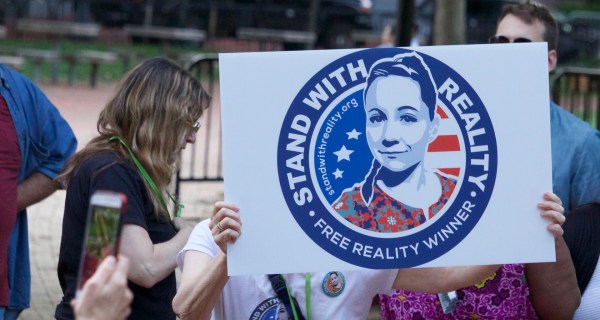Former NSA contractor Reality Winner accepts guilty plea for leaking classified report

Former National Security Agency contractor Reality Winner accepted a guilty plea agreement on Tuesday. For one count of espionage, Winner faces 63 months in prison and three years of supervised release. She originally faced 10 years in prison.
Final sentencing is yet to come.
Winner, 26, is a decorated former Air Force linguist who worked as a NSA contractor in Georgia. During her time there, she printed out classified material about the Russian government’s attempts at interference in U.S. elections and mailed the file to a reporter at The Intercept.
The report was published on June 5, 2017. Winner had already been arrested two days earlier.
The Intercept has stated it had no knowledge of the source’s identity.
“All of these actions I did willfully, meaning I did them of my own free will,” she said at Tuesday’s hearing.
Winner has been imprisoned for 13 months. The leaked documents helped inform the public about Russia’s desire to disrupt specific election technology vendors, who sell equipment to municipal and local governments that manage the voting process.
“Despite the fact that Winner’s disclosure served the public interest by alerting Americans to vulnerabilities in our voting system, the Trump-Sessions Justice Department prosecuted her with vicious resolve under the Espionage Act,” said The Intercept’s Editor-in-Chief Betsy Reed in a statement. “Her plea agreement reflects the conclusion of Winner and her lawyers that the terms of this deal represent the best outcome possible for her in the current environment. She not only faced unrelenting pressure from prosecutors, but a series of setbacks in the courtroom severely restricted her lawyers’ ability to defend her.”
Reed added, “She deserves better from her country, as do all journalistic sources who put themselves at risk for the greater good.”
Winner’s lawyers and family pointed to the Espionage Act, a century-old piece of legislation routinely criticized as draconian, as the reason she pleaded guilty on Tuesday. The ACLU calls it a “fundamentally unfair and unconstitutional law.”
The Espionage Act effectively bars defendants from making a public-interest defense and prevents them from telling a jury about their motive. For leakers who claim to be acting in the interest of the American public, it’s often looked at as a no-win situation. The Espionage Act has been used to charge or prosecute Pentagon Papers leaker Daniel Ellsberg, Chelsea Manning and Edward Snowden.
“As it stands, the Espionage Act makes no distinction between a civic-minded whistleblower who releases something that should never have been classified and which reveals illegal government activities, and a spy who sells genuinely damaging documents to a foreign government for cash,” the ACLU’s Jay Stanley wrote last year after Winner was first charged.
“The cards were stacked again at her and she couldn’t defend herself against the Espionage charge,” Winner’s mother said. “We need to work toward reforming laws so that the Espionage Act is not leveraged against our citizens.”
Over the last year, President Donald Trump and Attorney General Jeff Sessions have spoken at length about cracking down on so-called “leakers.” That effort was launched early on in the Trump administration, while the White House grappled with numerous negative news stories and scandals.
You can read the original criminal complaint against Winner below:
[documentcloud url=”http://www.documentcloud.org/documents/4560110-2017-06-05-Winner-Criminal-Complaint-Form.html”]






